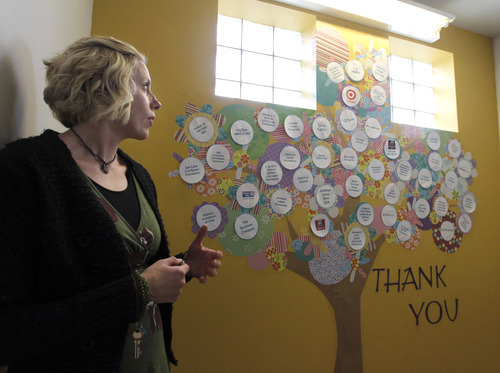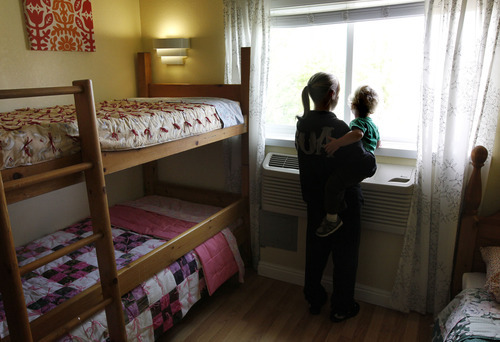This is an archived article that was published on sltrib.com in 2012, and information in the article may be outdated. It is provided only for personal research purposes and may not be reprinted.
West Jordan • The entrance to South Valley Sanctuary is guarded and gated.
But the domestic-violence shelter's bright, colorful rooms and grassy grounds are open year-round, at all hours, to men, women and children fleeing abuse.
And, unlike its closely guarded location, its good deeds are no secret.
The 12-year-old nonprofit is one of 25 celebrated this year by Utah health insurer SelectHealth with a $2,500 grant – every penny of which will be spent directly on client services, from transportation to translators. The shelter also will receive free marketing: a promotional video and air time on SelectHealth's social media channels.
"That's huge. That's what we need, word of mouth, so the community, those seeking help and offering it, knows we're here," said South Valley development director Jennifer Campbell.
The "Select 25" award goes to charities that make Utah healthier, whether that's a free health clinic or program encouraging kids to stay active.
Among this year's winners, picked from a pool of 360 nominations, were several groups aiding victims of violence, including:
• Salt Lake Sexual Assault Nurse Examiners, who provide medical care to rape victims and collect forensic evidence.
• Utah Health and Human Rights, which helps refugee torture survivors heal and rebuild their lives.
"When we evaluate winners, we focus on those we can help the most," said SelectHealth spokesman Spencer Sutherland.
The award is a boon to South Valley Sanctuary, which gave shelter and supportive services to 411 individuals last year on a meager $600,000 budget.
Without volunteer labor and donated food and furnishings, the shelter wouldn't survive, Campbell said.
Last year, there were 19 domestic-violence-related homicides in Utah, which was 32 percent of all murders, according to a report by the Utah Commission on Criminal and Juvenile Justice. Thousands escaped violence at shelters. Nearly as many were turned away due to a lack of resources and space.
South Valley is one of two shelters in Salt Lake County, but the only one catering to men.
"We're seeing an increase in men due to a rise in awareness of elder abuse," Campbell said.
Operationally, the shelter is a balance of contradictions.
The rooms are locked and private. Families don't double up, to avoid anyone being revictimized, and visitors are not allowed.
Privacy is paramount, and none of the residents consented to be interviewed.
But dinner is a communal affair, and two days a week residents participate in community meetings to sharpen dormant socialization skills.
Abusers use isolation and intimidation to control their victims, Campbell explained. "We encourage our clients to talk to each other, share experiences and form bonds."
Because most arrive with only the clothes on their back, they are given clothing, food, shampoo, toothpaste and diapers – anything they need. There's an on-site therapist and child-care center.
Residents are assigned to case managers who link them with public aid and negotiate with employers for time off or new hours. "Their workplace needs to be safe," Campbell said.
But they're encouraged to work, and, if they have income, to shop on their own. And they're in charge of cooking their own meals.
"It's an empowering tool we use. It's important that they get to choose what they eat, how they eat and when," Campbell said.
Despite being at capacity, the shelter was surprisingly quiet on a recent April afternoon.
Public outreach can be challenging in such a cloistered environment. But shelter staff attend community fairs and work with schools, law enforcement and other nonprofits to generate referrals and keep donations flowing.
And donations that go unused are sold at fund drives or given to other charities, generating good will.
On a staircase wall is a large "giving" tree where the shelter highlights supportive individuals, foundations and corporations.
"I tell our funders it's not for them," said Campbell.
"It's for our clients so they can see all the support in the community."
South Valley by the numbers
30 days • clients' average length of stay
13 rooms, 57 beds • capacity
24 hours, 365 days • hours of operation
411 • number of clients housed last year
2,368 • number of hot-line callers linked with other resources —
How to help
I To donate time, money or goods and clothing, call 801-255-1095 or visit http://www.southvalleysanctuary.com/ —
The face of violence
South Valley has no income guidelines, but most of its clients are low-income and homeless at the time they escape their dangerous living situation.
It takes a victim an average of seven times to leave an abuser before being free for good.
Research shows shelters significantly reduce the likelihood that a victim will be abused again.
Source: South Valley Sanctuary





